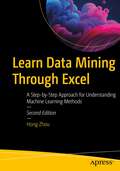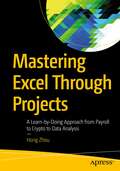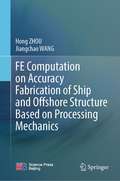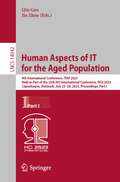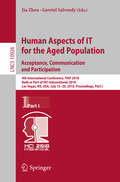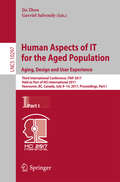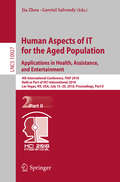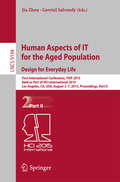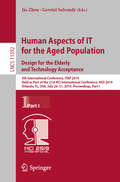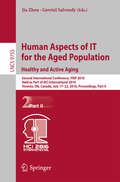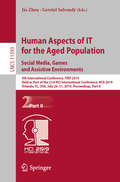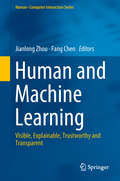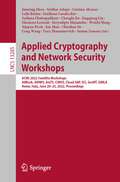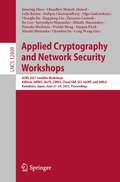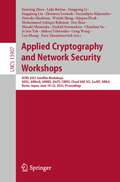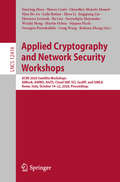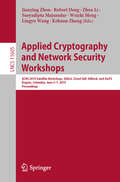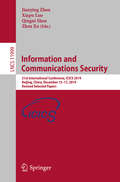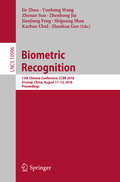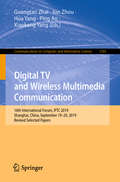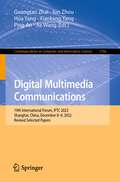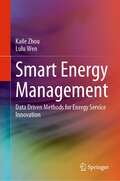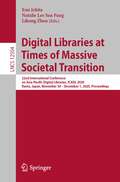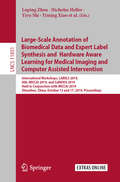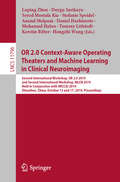- Table View
- List View
Learn Data Mining Through Excel: A Step-by-Step Approach for Understanding Machine Learning Methods
by Hong ZhouUse popular data mining techniques in Microsoft Excel to better understand machine learning methods. Most software tools and programming language packages take data input and deliver data mining results directly, presenting no insight on working mechanics and creating a chasm between input and output. This is where Excel can help, and this book will show you exactly how. This updated edition demonstrates how to work with data in a transparent manner using Excel. When you open an Excel file, data is visible immediately and you can work with it directly. You’ll see how to examine intermediate results even as you are still conducting your mining task, offering a deeper understanding of how data is manipulated, and results are obtained. These are critical aspects of the model construction process that are often hidden in software tools and programming language packages. Over the course of Learn Data Mining Through Excel, you will learn the data mining advantages the application offers when the data sets are not too large. You’ll see how to use Excel’s built-in features to create visual representations of your data, enabling you to present your findings in an accessible format. Author Hong Zhou walks you through each step, offering not only an active learning experience, but teaching you how the mining process works and how to find hidden patterns within the data. Upon completing this book, you will have a thorough understanding of how to use an application you very likely already have to mine and analyze data, and how to present results in various formats. What You Will Learn Comprehend data mining using a visual step-by-step approachGain an introduction to the fundamentals of data miningImplement data mining methods in ExcelUnderstand machine learning algorithmsLeverage Excel formulas and functions creativelyObtain hands-on experience with data mining and Excel Who This Book Is For Anyone who is interested in learning data mining or machine learning, especially data science visual learners and people skilled in Excel who would like to explore data science topics and/or expand their Excel skills. A basic or beginner level understanding of Excel is recommended.
Mastering Excel Through Projects: A Learn-by-Doing Approach from Payroll to Crypto to Data Analysis
by Hong ZhouMaster Excel in less than two weeks with this unique project-based book! Let’s face it, we all master skills in our own way, but building a soup-to-nuts project is one of the best ways to make learning stick and get up to speed quickly. Whether you are just getting started with Excel or are an experienced user, this book will elevate your knowledge and skills. For a beginner, the micro examples in each chapter will warm you up before you dive into the projects. For experienced users, the projects, especially those with table setup considerations, will help you become more creative in your interactions with Excel. Readers will benefit from building eight unique projects, each covering a different topic, including a word game, a food nutrition ranking, a payroll (tax withholding) calculation, an encryption, a two-way table, a Kaplan-Meier analysis, a data analysis via a pivot table and the K-means Clustering data mining method. Through these projects, you will experience firsthand how Excel skills are organized together to accomplish tasks that sound complex and daunting when first described. Get started with a word game which asks users to find English words that amount to exactly 100 points, with each letter of the alphabet assigned a point 1, 2, 3, … 26, respectively. You will disassemble a word into letters and then sum up their points, and then take it one step further, contemplating how to make the completed Excel worksheet more user friendly and completely automated. Increasingly challenging tasks like this example build on what you have learned and increase your confidence along the way, ensuring your mastery of Excel. What You Will Learn Gain confidence to tackle a challenging Excel-related mission, even those that seem impossibleBecome skilled in the creative uses of Excel formulas and functions and other built-in features Appreciate the art of refining worksheets to maximize automationUnderstand the value of treating each worksheet as a unique product Who This Book Is ForPeople who are interested in learning Excel as quickly and efficiently as possible. While Excel beginners and intermediate users are the primary audience, experienced Excel users might also discover new skills and ways of working with Excel.
FE Computation on Accuracy Fabrication of Ship and Offshore Structure Based on Processing Mechanics
by Hong ZHOU Jiangchao WANGThis book provides insight on processing mechanics during ship and offshore structure, and researchers, scientists, and engineers in the field of manufacturing process mechanics can benefit from the book. This book is written by subject experts based on the recent research results in FE computation on accuracy fabrication of ship and offshore structures based on processing mechanics. In order to deal with actual engineering problems during construction of ship and offshore structure, it proposes advanced computational approaches such as thermal elastic–plastic and elastic FE computations and employed to examine physical behavior and clarifies generation mechanism of mechanical response. As such, this book provides valuable knowledge, useful methods, and practical algorithms that can be considered in manufacturing process mechanics.
Human Aspects of IT for the Aged Population: 9th International Conference, ITAP 2023, Held as Part of the 25th HCI International Conference, HCII 2023, Copenhagen, Denmark, July 23–28, 2023, Proceedings, Part I (Lecture Notes in Computer Science #14042)
by Jia Zhou Qin GaoThis two-volume set of ITAP 2023, constitutes the refereed proceedings of the 9th International Conference on Human Aspects of IT for the Aged Population, ITAP 2023, held as Part of the 24th International Conference, HCI International 2023, which took place in July 2023 in Copenhagen, Denmark.The total of 1578 papers and 396 posters included in the HCII 2023 proceedings volumes was carefully reviewed and selected from 7472 submissions. The papers of ITAP 2023 Part I are organized in topical sections named: Designing and Assessing the Older Users' Experience; Aging and Social Media; Voice Assistants and Chatbots; Games and Exergames for Older People.
Human Aspects of IT for the Aged Population. Acceptance, Communication and Participation: 4th International Conference, ITAP 2018, Held as Part of HCI International 2018, Las Vegas, NV, USA, July 15–20, 2018, Proceedings, Part I (Lecture Notes in Computer Science #10926)
by Jia Zhou Gavriel SalvendyThis book constitutes the proceedings of the 4th International Conference onHuman Aspects of IT for the Aged Population, ITAP 2018, held as part of the 20th International Conference, HCI International 2018, which took place in Las Vegas, Nevada, in July 2018.The total of 1171 papers and 160 posters included in the 30 HCII 2018 proceedings volumes was carefully reviewed and selected from 4346 submissions. ITAP 2018 includes a total of 84 papers. They were organized in topical sections as follows: Part I: aging and technology acceptance; aging and interaction; intergenerational communication and social participation. Part II: health care technologies and services for the elderly; intelligent environments for aging; and games and entertainment for the elderly.
Human Aspects of IT for the Aged Population. Aging, Design and User Experience
by Jia Zhou Gavriel SalvendyThe two-volume set LNCS 10297 + 10298 constitutes the refereed proceedings of the Third International Conference on Human Aspects of IT for the Aged Population, ITAP 2017, held as part of HCI International 2017 in Vancouver, BC, Canada. HCII 2017 received a total of 4340 submissions, of which 1228 papers were accepted for publication after a careful reviewing process. The 83 papers presented in the two volumes of ITAP 2017 were organized in topical sections as follows: Part I: aging and technology acceptance; user-centred design for the elderly; product design for the elderly; aging and user experience; digital literacy and training. Part II: mobile and wearable interaction for the elderly; aging and social media; silver and intergenerational gaming; health care and assistive technologies and services for the elderly; aging and learning, working and leisure.
Human Aspects of IT for the Aged Population. Applications in Health, Assistance, and Entertainment: 4th International Conference, ITAP 2018, Held as Part of HCI International 2018, Las Vegas, NV, USA, July 15–20, 2018, Proceedings, Part II (Lecture Notes in Computer Science #10927)
by Jia Zhou Gavriel SalvendyThis book constitutes the proceedings of the 4th International Conference onHuman Aspects of IT for the Aged Population, ITAP 2018, held as part of the 20th International Conference, HCI International 2018, which took place in Las Vegas, Nevada, in July 2018. The total of 1171 papers and 160 posters included in the 30 HCII 2018 proceedings volumes was carefully reviewed and selected from 4346 submissions. ITAP 2018 includes a total of 84 papers. They were organized in topical sections as follows: Part I: aging and technology acceptance; aging and interaction; intergenerational communication and social participation. Part II: health care technologies and services for the elderly; intelligent environments for aging; and games and entertainment for the elderly.
Human Aspects of IT for the Aged Population. Design for Everyday Life
by Jia Zhou Gavriel SalvendyThe two LNCS volume set 9193-9194 constitutes the refereed proceedings of the First International Conference on Human Aspects of IT for the Aged Population, ITAP 2015, held as part of the 17th International Conference on Human-Computer Interaction, HCII 2015, held in Los Angeles, CA, USA, in August 2015, jointly with 15 other thematically conferences. The total of 1462 papers and 246 posters presented at the HCII 2015 conferences were carefully reviewed and selected from 4843 submissions. These papers of the two volume set address as follows: LNCS 9193, Design for Aging (Part I), addressing the following major topics: HCI design and evaluation methods for the elderly; ICT use and acceptance; aging, the web and social media; and the elderly and mobile devices and LNCS 9194, Design for Everyday Life (Part II), addressing the following major topics: health care technologies and services for the elderly; home and work support; smart environment and AAL; and communication, games, and entertainment.
Human Aspects of IT for the Aged Population. Design for the Elderly and Technology Acceptance: 5th International Conference, ITAP 2019, Held as Part of the 21st HCI International Conference, HCII 2019, Orlando, FL, USA, July 26-31, 2019, Proceedings, Part I (Lecture Notes in Computer Science #11592)
by Jia Zhou Gavriel SalvendyThis two-volume set LNCS 11592 and 11593 constitutes the refereed proceedings of the 5th International Conference on Human Aspects of IT for the Aged Population, ITAP 2019, held in July 2019 as part of HCI International 2019 in Orlando, FL, USA. HCII 2019 received a total of 5029 submissions, of which 1275 papers and 209 posters were accepted for publication after a careful reviewing process. The 86 papers presented in these two volumes are organized in topical sections named: Design with and for the Elderly, Aging and Technology Acceptance, Aging and the User Experience, Elderly-Specific Web Design, Aging and Social Media, Games and Exergames for the Elderly, Ambient Assisted Living, Aging, Motion, Cognition, Emotion and Learning.
Human Aspects of IT for the Aged Population. Healthy and Active Aging
by Jia Zhou Gavriel SalvendyThe two LNCS volume set 9754-9755 constitutes the refereed proceedings of the Second International Conference on Human Aspects of IT for the Aged Population, ITAP 2016, held as part of the 18th International Conference on Human-Computer Interaction, HCII 2016, held in Toronto, ON, Canada, in July 2016, jointly with 14 other thematically conferences. The total of 1287 papers presented at the HCII 2016 conferences were carefully reviewed and selected from 4354 submissions. LNCS 9754, Design for Aging (Part I), addresses the following major topics: designing for and with the elderly; technology use and acceptance by older users; psychological and cognitive aspects of interaction and aging; and mobile and wearable technologies for the elderly. LNCS 9755, Healthy and Active Aging (Part II), addresses these major topics: smart and assistive environments; aging and social media; aging, learning, training and games; and aging, mobility and driving.
Human Aspects of IT for the Aged Population. Social Media, Games and Assistive Environments: 5th International Conference, ITAP 2019, Held as Part of the 21st HCI International Conference, HCII 2019, Orlando, FL, USA, July 26-31, 2019, Proceedings, Part II (Lecture Notes in Computer Science #11593)
by Jia Zhou Gavriel SalvendyThis two-volume set LNCS 11592 and 11593 constitutes the refereed proceedings of the 5th International Conference on Human Aspects of IT for the Aged Population, ITAP 2019, held in July 2019 as part of HCI International 2019 in Orlando, FL, USA. HCII 2019 received a total of 5029 submissions, of which 1275 papers and 209 posters were accepted for publication after a careful reviewing process. The 86 papers presented in these two volumes are organized in topical sections named: Design with and for the Elderly, Aging and Technology Acceptance, Aging and the User Experience, Elderly-Specific Web Design, Aging and Social Media, Games and Exergames for the Elderly, Ambient Assisted Living, Aging, Motion, Cognition, Emotion and Learning.
Human and Machine Learning: Visible, Explainable, Trustworthy and Transparent (Human–Computer Interaction Series)
by Jianlong Zhou Fang ChenWith an evolutionary advancement of Machine Learning (ML) algorithms, a rapid increase of data volumes and a significant improvement of computation powers, machine learning becomes hot in different applications. However, because of the nature of “black-box” in ML methods, ML still needs to be interpreted to link human and machine learning for transparency and user acceptance of delivered solutions. This edited book addresses such links from the perspectives of visualisation, explanation, trustworthiness and transparency. The book establishes the link between human and machine learning by exploring transparency in machine learning, visual explanation of ML processes, algorithmic explanation of ML models, human cognitive responses in ML-based decision making, human evaluation of machine learning and domain knowledge in transparent ML applications. This is the first book of its kind to systematically understand the current active research activities and outcomes related to human and machine learning. The book will not only inspire researchers to passionately develop new algorithms incorporating human for human-centred ML algorithms, resulting in the overall advancement of ML, but also help ML practitioners proactively use ML outputs for informative and trustworthy decision making. This book is intended for researchers and practitioners involved with machine learning and its applications. The book will especially benefit researchers in areas like artificial intelligence, decision support systems and human-computer interaction.
Applied Cryptography and Network Security Workshops: ACNS 2022 Satellite Workshops, AIBlock, AIHWS, AIoTS, CIMSS, Cloud S&P, SCI, SecMT, SiMLA, Rome, Italy, June 20–23, 2022, Proceedings (Lecture Notes in Computer Science #13285)
by Jianying Zhou Sridhar Adepu Cristina Alcaraz Lejla Batina Emiliano Casalicchio Sudipta Chattopadhyay Chenglu Jin Jingqiang Lin Eleonora Losiouk Suryadipta Majumdar Weizhi Meng Stjepan Picek Jun Shao Chunhua Su Cong Wang Yury Zhauniarovich Saman ZonouzThis book constitutes the proceedings of the satellite workshops held around the 20th International Conference on Applied Cryptography and Network Security, ACNS 2022, held in Rome, Italy, in June 2022. Due to the Corona pandemic the workshop was held as a virtual event. The 31 papers presented in this volume were carefully reviewed and selected from 52 submissions. They stem from the following workshops:– AIBlock: 4th ACNS Workshop on Application Intelligence and Blockchain Security– AIHWS: 3rd ACNS Workshop on Artificial Intelligence in Hardware Security– AIoTS: 4th ACNS Workshop on Artificial Intelligence and Industrial IoT Security– CIMSS: 2nd ACNS Workshop on Critical Infrastructure and Manufacturing System Security– Cloud S&P: 4th ACNS Workshop on Cloud Security and Privacy– SCI: 3rd ACNS Workshop on Secure Cryptographic Implementation– SecMT: 3rd ACNS Workshop on Security in Mobile Technologies– SiMLA: 4th ACNS Workshop on Security in Machine Learning and its Applications
Applied Cryptography and Network Security Workshops: ACNS 2021 Satellite Workshops, AIBlock, AIHWS, AIoTS, CIMSS, Cloud S&P, SCI, SecMT, and SiMLA, Kamakura, Japan, June 21–24, 2021, Proceedings (Lecture Notes in Computer Science #12809)
by Jianying Zhou Chuadhry Mujeeb Ahmed Lejla Batina Sudipta Chattopadhyay Olga Gadyatskaya Chenglu Jin Jingqiang Lin Eleonora Losiouk Bo Luo Suryadipta Majumdar Mihalis Maniatakos Daisuke Mashima Weizhi Meng Stjepan Picek Masaki Shimaoka Chunhua Su Cong WangThis book constitutes the proceedings of the satellite workshops held around the 19th International Conference on Applied Cryptography and Network Security, ACNS 2021, held in Kamakura, Japan, in June 2021.The 26 papers presented in this volume were carefully reviewed and selected from 49 submissions. They stem from the following workshops: AIBlock 2021: Third International Workshop on Application Intelligence and Blockchain Security AIHWS 2021: Second International Workshop on Artificial Intelligence in Hardware Security AIoTS 2021: Third International Workshop on Artificial Intelligence and Industrial IoT Security CIMSS 2021: First International Workshop on Critical Infrastructure and Manufacturing System Security Cloud S&P 2021: Third International Workshop on Cloud Security and Privacy SCI 2021: Second International Workshop on Secure Cryptographic Implementation SecMT 2021: Second International Workshop on Security in Mobile Technologies SiMLA 2021; Third International Workshop on Security in Machine Learning and its ApplicationsDue to the Corona pandemic the workshop was held as a virtual event.
Applied Cryptography and Network Security Workshops: ACNS 2023 Satellite Workshops, ADSC, AIBlock, AIHWS, AIoTS, CIMSS, Cloud S&P, SCI, SecMT, SiMLA, Kyoto, Japan, June 19–22, 2023, Proceedings (Lecture Notes in Computer Science #13907)
by Jianying Zhou Lejla Batina Zengpeng Li Jingqiang Lin Eleonora Losiouk Suryadipta Majumdar Daisuke Mashima Weizhi Meng Stjepan Picek Mohammad Ashiqur Rahman Jun Shao Masaki Shimaoka Ezekiel Soremekun Chunhua Su Je Sen Teh Aleksei Udovenko Cong Wang Leo Zhang Yury ZhauniarovichThis book constitutes the proceedings of the satellite workshops held around the 21st International Conference on Applied Cryptography and Network Security, ACNS 2023, held in Kyoto, Japan, in June 2023.The 34 full papers and 13 poster papers presented in this volume were carefully reviewed and selected from 76 submissions. They stem from the following workshops: · 1st ACNS Workshop on Automated Methods and Data-driven Techniques in Symmetric-key Cryptanalysis (ADSC 2023) · 5th ACNS Workshop on Application Intelligence and Blockchain Security (AIBlock 2023) · 4th ACNS Workshop on Artificial Intelligence in Hardware Security (AIHWS 2023) · 5th ACNS Workshop on Artificial Intelligence and Industrial IoT Security (AIoTS 2023) · 3rd ACNS Workshop on Critical Infrastructure and Manufacturing System Security (CIMSS 2023) · 5th ACNS Workshop on Cloud Security and Privacy (Cloud S&P 2023) · 4th ACNS Workshop on Secure Cryptographic Implementation (SCI 2023) · 4th ACNS Workshop on Security in Mobile Technologies (SecMT 2023) · 5th ACNS Workshop on Security in Machine Learning and its Applications (SiMLA 2023)
Applied Cryptography and Network Security Workshops: ACNS 2020 Satellite Workshops, AIBlock, AIHWS, AIoTS, Cloud S&P, SCI, SecMT, and SiMLA, Rome, Italy, October 19–22, 2020, Proceedings (Lecture Notes in Computer Science #12418)
by Jianying Zhou Mauro Conti Chuadhry Mujeeb Ahmed Man Ho Au Lejla Batina Zhou Li Jingqiang Lin Eleonora Losiouk Bo Luo Suryadipta Majumdar Weizhi Meng Martín Ochoa Stjepan Picek Georgios Portokalidis Cong Wang Kehuan ZhangThis book constitutes the proceedings of the satellite workshops held around the 18th International Conference on Applied Cryptography and Network Security, ACNS 2020, in Rome, Italy, in October 2020. The 31 papers presented in this volume were carefully reviewed and selected from 65 submissions. They stem from the following workshops: AIBlock 2020:Second International Workshop on Application Intelligence and Blockchain Security AIHWS 2020:First International Workshop on Artificial Intelligence in Hardware Security AIoTS 2020:Second International Workshop on Artificial Intelligence and Industrial Internet-of-Things Security Cloud S&P 2020:Second International Workshop on Cloud Security and Privacy SCI 2020:First International Workshop on Secure Cryptographic Implementation SecMT 2020:First International Workshop on Security in Mobile Technologies SiMLA 2020: Second International Workshop on Security in Machine Learning and its Applications
Applied Cryptography and Network Security Workshops: ACNS 2019 Satellite Workshops, SiMLA, Cloud S&P, AIBlock, and AIoTS, Bogota, Colombia, June 5–7, 2019, Proceedings (Lecture Notes in Computer Science #11605)
by Jianying Zhou Robert Deng Zhou Li Suryadipta Majumdar Weizhi Meng Lingyu Wang Kehuan ZhangThis book constitutes the proceedings of the satellite workshops held around the 17th International Conference on Applied Cryptography and Network Security, ACNS 2019, in Bogota, Colombia, in June 2019. The 10 papers presented in this volume were carefully reviewed and selected from 30 submissions. They stem from the following workshops:AIBlock 2019: First International Workshop on Application Intelligence and Blockchain SecurityAIoTS 2019:First International Workshop on Articial Intelligence and Industrial Internet-of-Things SecurityCloud S&P 2019:First International Workshop on Cloud Security and PrivacyPriDA 2019:First InternationalWorkshop on Privacy-preserving Distributed Data AnalysisSiMLA 2019: First International Workshop on Security in Machine Learning and its Applications
Information and Communications Security: 21st International Conference, ICICS 2019, Beijing, China, December 15–17, 2019, Revised Selected Papers (Lecture Notes in Computer Science #11999)
by Jianying Zhou Xiapu Luo Qingni Shen Zhen XuThis book constitutes the refereed proceedings of the 21th International Conference on Information and Communications Security, ICICS 2019, held in Beijing, China, in December 2019. The 47 revised full papers were carefully selected from 199 submissions. The papers are organized in topics on malware analysis and detection, IoT and CPS security enterprise network security, software security, system security, authentication, applied cryptograph internet security, machine learning security, machine learning privacy, Web security, steganography and steganalysis.
Biometric Recognition: 13th Chinese Conference, CCBR 2018, Urumqi, China, August 11-12, 2018, Proceedings (Lecture Notes in Computer Science #10996)
by Jie Zhou Yunhong Wang Zhenan Sun Zhenhong Jia Jianjiang Feng Shiguang Shan Kurban Ubul Zhenhua GuoThe LNCS volume 10996 constitutes the proceedings of the 13th Chinese Conference on Biometric Recognition, held in Urumchi, China, in August 2018. The 79 full papers and 67 poster papers presented were carefully reviewed and selected from 112 submissions. The papers cover a wide range of topics such as Biometrics, Speech recognition, Activity recognition and understanding, Online handwriting recognition, System forensics, Multi-factor authentication, Graphical and visual passwords.
Digital TV and Wireless Multimedia Communication: 16th International Forum, IFTC 2019, Shanghai, China, September 19–20, 2019, Revised Selected Papers (Communications in Computer and Information Science #1181)
by Jun Zhou Xiaokang Yang Guangtao Zhai Ping An Hua YangThis book presents revised selected papers from the 16th International Forum on Digital TV and Wireless Multimedia Communication, IFTC 2019, held in Shanghai, China, in September 2019.The 34 full papers presented in this volume were carefully reviewed and selected from 120 submissions. They were organized in topical sections on image processing; machine learning; quality assessment; telecommunications; video surveillance; virtual reality.
Digital Multimedia Communications: The 9th International Forum, IFTC 2022, Shanghai, China, December 8–9, 2022, Revised Selected Papers (Communications in Computer and Information Science #1766)
by Jun Zhou Xiaokang Yang Guangtao Zhai Jia Wang Ping An Hua YangThis book constitutes the refereed proceedings of the 9th International Forum on Digital Multimedia Communication, IFTC 2022, held in Shanghai, China, December 8–9, 2022.The 40 full papers included in this book were carefully reviewed and selected from 112 submissions. They were organized in topical sections as follows: Computer Vision; Image Analysis; Quality Assessment; Video Processing; Machine Learning; and Big data.
Smart Energy Management: Data Driven Methods for Energy Service Innovation
by Kaile Zhou Lulu WenThis book provides a relatively whole view of data-driven decision-making methods for energy service innovation and energy system optimization. Through personalized energy services provision and energy efficiency improvement, the book can contribute to the green transformation of energy system and the sustainable development of the society. The book gives a new way to achieve smart energy management, based on various data mining and machine learning methods, including fuzzy clustering, shape-based clustering, ensemble clustering, deep learning, and reinforcement learning. The applications of these data-driven methods in improving energy efficiency and supporting energy service innovation are presented. Moreover, this book also investigates the role of blockchain in supporting peer-to-peer (P2P) electricity trading innovation, thus supporting smart energy management. The general scope of this book mainly includes load clustering, load forecasting, price-based demand response, incentive-based demand response, and energy blockchain-based electricity trading. The intended readership of the book includes researchers and engineers in related areas, graduate and undergraduate students in university, and some other general interested audience. The important features of the book are: (1) it introduces various data-driven methods for achieving different smart energy management tasks; (2) it investigates the role of data-driven methods in supporting various energy service innovation; and (3) it explores energy blockchain in P2P electricity trading, and thus supporting smart energy management.
Digital Libraries at Times of Massive Societal Transition: 22nd International Conference on Asia-Pacific Digital Libraries, ICADL 2020, Kyoto, Japan, November 30 – December 1, 2020, Proceedings (Lecture Notes in Computer Science #12504)
by Lihong Zhou Emi Ishita Natalie Lee San PangThis book constitutes the refereed proceedings of the 22nd International Conference on Asia-Pacific Digital Libraries, ICADL 2020, which was planned to be held in Kyoto, Japan, in November/December 2020, but it was held virtually due to the COVID-19 pandemic.The 10 full, 15 short, 4 practitioners, and 10 work-in-progress papers presented in this volume were carefully reviewed and selected from 79 submissions. The papers were organized in topical sections named: natural language processing; knowledge structures; citation data analysis; user analytics; application of cultural and historical data; social media; metadata and infrastructure; and scholarly data mining.
Large-Scale Annotation of Biomedical Data and Expert Label Synthesis and Hardware Aware Learning for Medical Imaging and Computer Assisted Intervention: International Workshops, LABELS 2019, HAL-MICCAI 2019, and CuRIOUS 2019, Held in Conjunction with MICCAI 2019, Shenzhen, China, October 13 and 17, 2019, Proceedings (Lecture Notes in Computer Science #11851)
by Luping Zhou Nicholas Heller Yiyu Shi Yiming Xiao Raphael Sznitman Veronika Cheplygina Diana Mateus Emanuele Trucco X. Sharon Hu Danny Chen Matthieu Chabanas Hassan Rivaz Ingerid ReinertsenThis book constitutes the refereed joint proceedings of the 4th International Workshop on Large-Scale Annotation of Biomedical Data and Expert Label Synthesis, LABELS 2019, the First International Workshop on Hardware Aware Learning for Medical Imaging and Computer Assisted Intervention, HAL-MICCAI 2019, and the Second International Workshop on Correction of Brainshift with Intra-Operative Ultrasound, CuRIOUS 2019, held in conjunction with the 22nd International Conference on Medical Imaging and Computer-Assisted Intervention, MICCAI 2019, in Shenzhen, China, in October 2019. The 8 papers presented at LABELS 2019, the 5 papers presented at HAL-MICCAI 2019, and the 3 papers presented at CuRIOUS 2019 were carefully reviewed and selected from numerous submissions. The LABELS papers present a variety of approaches for dealing with a limited number of labels, from semi-supervised learning to crowdsourcing. The HAL-MICCAI papers cover a wide set of hardware applications in medical problems, including medical image segmentation, electron tomography, pneumonia detection, etc. The CuRIOUS papers provide a snapshot of the current progress in the field through extended discussions and provide researchers an opportunity to characterize their image registration methods on newly released standardized datasets of iUS-guided brain tumor resection.
OR 2.0 Context-Aware Operating Theaters and Machine Learning in Clinical Neuroimaging: Second International Workshop, OR 2.0 2019, and Second International Workshop, MLCN 2019, Held in Conjunction with MICCAI 2019, Shenzhen, China, October 13 and 17, 2019, Proceedings (Lecture Notes in Computer Science #11796)
by Luping Zhou Duygu Sarikaya Seyed Mostafa Kia Stefanie Speidel Anand Malpani Daniel Hashimoto Mohamad Habes Tommy Löfstedt Kerstin Ritter Hongzhi WangThis book constitutes the refereed proceedings of the Second International Workshop on Context-Aware Surgical Theaters, OR 2.0 2019, and the Second International Workshop on Machine Learning in Clinical Neuroimaging, MLCN 2019, held in conjunction with MICCAI 2019, in Shenzhen, China, in October 2019. For OR 2.0 all 6 submissions were accepted for publication. They aim to highlight the potential use of machine vision and perception, robotics, surgical simulation and modeling, multi-modal data fusion and visualization, image analysis, advanced imaging, advanced display technologies, human-computer interfaces, sensors, wearable and implantable electronics and robots, visual attention models, cognitive models, decision support networks to enhance surgical procedural assistance, context-awareness and team communication in the operating theater, human-robot collaborative systems, and surgical training and assessment. MLCN 2019 accepted 6 papers out of 7 submissions for publication. They focus on addressing the problems of applying machine learning to large and multi-site clinical neuroimaging datasets. The workshop aimed to bring together experts in both machine learning and clinical neuroimaging to discuss and hopefully bridge the existing challenges of applied machine learning in clinical neuroscience.
